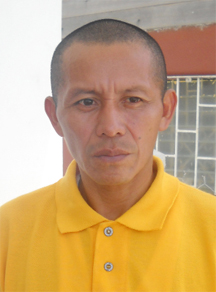Toshao of the Region Seven community of Kurutuku, Solomon Lewis says that an increase in mining since last year has created problems for the remote community and is appealing for demarcation of land to be done quickly, since the damage could cause the death of the village.
“Our water was being polluted, destroying our fishes because I would say at the present moment, the fish that we love to eat we can’t find that now. They kill the fishes, they kill the animals. We can’t get to use any water anywhere,” Lewis said at an AFC press conference on Wednesday. He said that pleas to the government have fallen on deaf ears. “So I would say, at this moment, we, the people in Kurutuku, we are living in a kind of a nightmare ‘cause we don’t know when this problem will be solved so we could continue the peaceful livelihood that we Amerindians are accustomed to,” he said.

Lewis related that at the recently held National Toshaos Conference, the majority of toshaos from Region Seven were not given the opportunity to voice the issues affecting their villages, such as mining and demarcation of land.
Kurutuku is found in the Upper Cuyuni and has a population of fewer than 200 persons, from the Carib Amerindian tribe. Lewis said that government has promised since last year that the land would be demarcated but this promise is still to be fulfilled. “I was anxiously awaiting but then surprisingly now before I came out, I was informed by one of our CDOs (Community Development Officers) that due to the budget cut by the combined opposition, no Amerindian village would be demarcated,” he said.
Lewis said that he found this “disturbing” and held a village meeting. If the village does not get title to its land then mining problems “would really damage the existence of Kurutuku village.” If the issue is not settled in a couple of years, there would be no village, he warned. He said that the village has decided that it cannot wait on the government and wants to carry out its own demarcation and he wanted to raise this at the conference but was not given the opportunity. He said the chairperson of the conference said that time was short but he pointed out that lengthy time was given to persons from other regions who made statements about the good support they were receiving from the government. “They give those persons the lengthy time but when it came to the real issues such as the one we are experiencing, mining and demarcation from Region Seven,” they did not, he said.
Lewis recalled that the village council applied to the Ministry of Amerindian Affairs for demarcation twice: on December 8, 2009, for which it received no response; and on August 31, 2010. There was no response to either, he said. In a previous interview with Stabroek News, Lewis had said that the village had received a land title in 1991, which recognised only a small portion of the land the villagers considered their own. He had said that at the 2009 National Toshaos Conference, he received another title for the same piece of land but the land the village had applied for was not included, he said.
The village leader noted that he had met Prime Minister Samuel Hinds and Amerindian Affairs Minister Pauline Sukhai and Guyana Geology and Mines Commission (GGMC) personnel in the past and had related to them the destruction of the environment and pollution of water that the community was experiencing.
He said that the villagers more or less depend on large creeks in area for drinking water and have been calling on the Ministry and the GGMC not to give mining permits in the area.
Currently, there are over 25 excavators working in the community, Lewis noted, while adding that the permission of the village was never sought nor was it informed. He said that he had seen a map which indicated that 94 mining concession blocks are within the village. He noted that although any person who wishes to carry out any project has, under the provisions of the Amerindian Act, to obtain consent of the village council, he was never notified.
Meanwhile, Lewis said that it has only been a year now since a school was restarted in the community—the last was in 1978—but assistance such as those given to other schools, is limited. He also said that the medical supplies for the village are limited and for certain aliments, there are no drugs available.
AFC leader Khemraj Ramjattan said that he will raise the issue in the National Assembly but noted that it is currently in recess until October.








